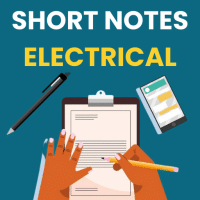Electrical Engineering (EE) Exam > Electrical Engineering (EE) Questions > What type of protection is used for LT lines ...
Start Learning for Free
What type of protection is used for LT lines passing through agricultural fields?
- a)Zero factor protection
- b)Lewis defense
- c)Direct protection
- d)PVC protection
Correct answer is option 'D'. Can you explain this answer?
Verified Answer
What type of protection is used for LT lines passing through agricultu...
Zero factor protection: This option doesn't correspond to known electrical protection systems. The term "zero factor" does not define a type of standard protection that is used for electrical lines.
Lewis defense: This term is not associated with electrical protection systems. It might be confused with a strategy in game theory or related to military use but is not applicable in this context.
Direct protection: It generally refers to methods that protect equipment or lines directly, like using fuses, circuit breakers, or relays. However, these don't necessarily refer to specific methods to protect LT lines passing through fields.
PVC protection: It's a common practice to use PVC (Polyvinyl Chloride) for covering the LT (Low Tension) lines in agricultural fields. The PVC casing or conduits provide insulation, preventing direct exposure to the conducting wire, reducing the risk of electrical shock, and protecting the wires from damage due to weather conditions or farm-related activities. So this is the correct answer amongst the provided options.
Most Upvoted Answer
What type of protection is used for LT lines passing through agricultu...
LT lines passing through agricultural fields are often exposed to various environmental factors such as weather conditions, vegetation, and animals. These factors can pose a risk to the electrical infrastructure and may lead to electrical faults or damage. To mitigate these risks and provide protection to the LT lines, PVC protection is commonly used.
PVC (Polyvinyl Chloride) is a type of plastic material that is widely used for its durability, insulation properties, and resistance to environmental factors. It is commonly used in electrical installations to provide protection to cables and wires. In the case of LT lines passing through agricultural fields, PVC protection is used to safeguard the cables from potential damage.
Below are the key points explaining why PVC protection is used for LT lines passing through agricultural fields:
1. Protection against physical damage: Agricultural fields are typically prone to activities such as plowing, tilling, and harvesting. These activities involve the use of heavy machinery and tools that can potentially damage the LT lines. PVC protection provides a physical barrier around the cables, protecting them from accidental impacts and mechanical stress.
2. Protection against moisture and water: Agricultural fields often have high moisture content due to irrigation or natural conditions. Moisture can cause electrical short circuits and deteriorate the cables over time. PVC material has excellent water resistance properties, preventing moisture from entering the cables and ensuring their longevity.
3. Protection against chemicals: Agricultural fields may contain chemicals such as fertilizers, pesticides, and herbicides. These chemicals can corrode the LT lines and compromise their performance. PVC material is chemically inert and resistant to various agricultural chemicals, providing a protective layer against chemical damage.
4. Protection against animals: Animals such as rodents and livestock can pose a threat to the LT lines by chewing or scratching the cables. PVC protection acts as a barrier, preventing animals from accessing the cables and causing any damage.
In conclusion, PVC protection is used for LT lines passing through agricultural fields to provide physical, moisture, chemical, and animal protection. This ensures the durability and reliability of the electrical infrastructure in such environments.
PVC (Polyvinyl Chloride) is a type of plastic material that is widely used for its durability, insulation properties, and resistance to environmental factors. It is commonly used in electrical installations to provide protection to cables and wires. In the case of LT lines passing through agricultural fields, PVC protection is used to safeguard the cables from potential damage.
Below are the key points explaining why PVC protection is used for LT lines passing through agricultural fields:
1. Protection against physical damage: Agricultural fields are typically prone to activities such as plowing, tilling, and harvesting. These activities involve the use of heavy machinery and tools that can potentially damage the LT lines. PVC protection provides a physical barrier around the cables, protecting them from accidental impacts and mechanical stress.
2. Protection against moisture and water: Agricultural fields often have high moisture content due to irrigation or natural conditions. Moisture can cause electrical short circuits and deteriorate the cables over time. PVC material has excellent water resistance properties, preventing moisture from entering the cables and ensuring their longevity.
3. Protection against chemicals: Agricultural fields may contain chemicals such as fertilizers, pesticides, and herbicides. These chemicals can corrode the LT lines and compromise their performance. PVC material is chemically inert and resistant to various agricultural chemicals, providing a protective layer against chemical damage.
4. Protection against animals: Animals such as rodents and livestock can pose a threat to the LT lines by chewing or scratching the cables. PVC protection acts as a barrier, preventing animals from accessing the cables and causing any damage.
In conclusion, PVC protection is used for LT lines passing through agricultural fields to provide physical, moisture, chemical, and animal protection. This ensures the durability and reliability of the electrical infrastructure in such environments.

|
Explore Courses for Electrical Engineering (EE) exam
|

|
Question Description
What type of protection is used for LT lines passing through agricultural fields?a)Zero factor protectionb)Lewis defensec)Direct protectiond)PVC protectionCorrect answer is option 'D'. Can you explain this answer? for Electrical Engineering (EE) 2025 is part of Electrical Engineering (EE) preparation. The Question and answers have been prepared according to the Electrical Engineering (EE) exam syllabus. Information about What type of protection is used for LT lines passing through agricultural fields?a)Zero factor protectionb)Lewis defensec)Direct protectiond)PVC protectionCorrect answer is option 'D'. Can you explain this answer? covers all topics & solutions for Electrical Engineering (EE) 2025 Exam. Find important definitions, questions, meanings, examples, exercises and tests below for What type of protection is used for LT lines passing through agricultural fields?a)Zero factor protectionb)Lewis defensec)Direct protectiond)PVC protectionCorrect answer is option 'D'. Can you explain this answer?.
What type of protection is used for LT lines passing through agricultural fields?a)Zero factor protectionb)Lewis defensec)Direct protectiond)PVC protectionCorrect answer is option 'D'. Can you explain this answer? for Electrical Engineering (EE) 2025 is part of Electrical Engineering (EE) preparation. The Question and answers have been prepared according to the Electrical Engineering (EE) exam syllabus. Information about What type of protection is used for LT lines passing through agricultural fields?a)Zero factor protectionb)Lewis defensec)Direct protectiond)PVC protectionCorrect answer is option 'D'. Can you explain this answer? covers all topics & solutions for Electrical Engineering (EE) 2025 Exam. Find important definitions, questions, meanings, examples, exercises and tests below for What type of protection is used for LT lines passing through agricultural fields?a)Zero factor protectionb)Lewis defensec)Direct protectiond)PVC protectionCorrect answer is option 'D'. Can you explain this answer?.
Solutions for What type of protection is used for LT lines passing through agricultural fields?a)Zero factor protectionb)Lewis defensec)Direct protectiond)PVC protectionCorrect answer is option 'D'. Can you explain this answer? in English & in Hindi are available as part of our courses for Electrical Engineering (EE).
Download more important topics, notes, lectures and mock test series for Electrical Engineering (EE) Exam by signing up for free.
Here you can find the meaning of What type of protection is used for LT lines passing through agricultural fields?a)Zero factor protectionb)Lewis defensec)Direct protectiond)PVC protectionCorrect answer is option 'D'. Can you explain this answer? defined & explained in the simplest way possible. Besides giving the explanation of
What type of protection is used for LT lines passing through agricultural fields?a)Zero factor protectionb)Lewis defensec)Direct protectiond)PVC protectionCorrect answer is option 'D'. Can you explain this answer?, a detailed solution for What type of protection is used for LT lines passing through agricultural fields?a)Zero factor protectionb)Lewis defensec)Direct protectiond)PVC protectionCorrect answer is option 'D'. Can you explain this answer? has been provided alongside types of What type of protection is used for LT lines passing through agricultural fields?a)Zero factor protectionb)Lewis defensec)Direct protectiond)PVC protectionCorrect answer is option 'D'. Can you explain this answer? theory, EduRev gives you an
ample number of questions to practice What type of protection is used for LT lines passing through agricultural fields?a)Zero factor protectionb)Lewis defensec)Direct protectiond)PVC protectionCorrect answer is option 'D'. Can you explain this answer? tests, examples and also practice Electrical Engineering (EE) tests.

|
Explore Courses for Electrical Engineering (EE) exam
|

|
Signup for Free!
Signup to see your scores go up within 7 days! Learn & Practice with 1000+ FREE Notes, Videos & Tests.


















